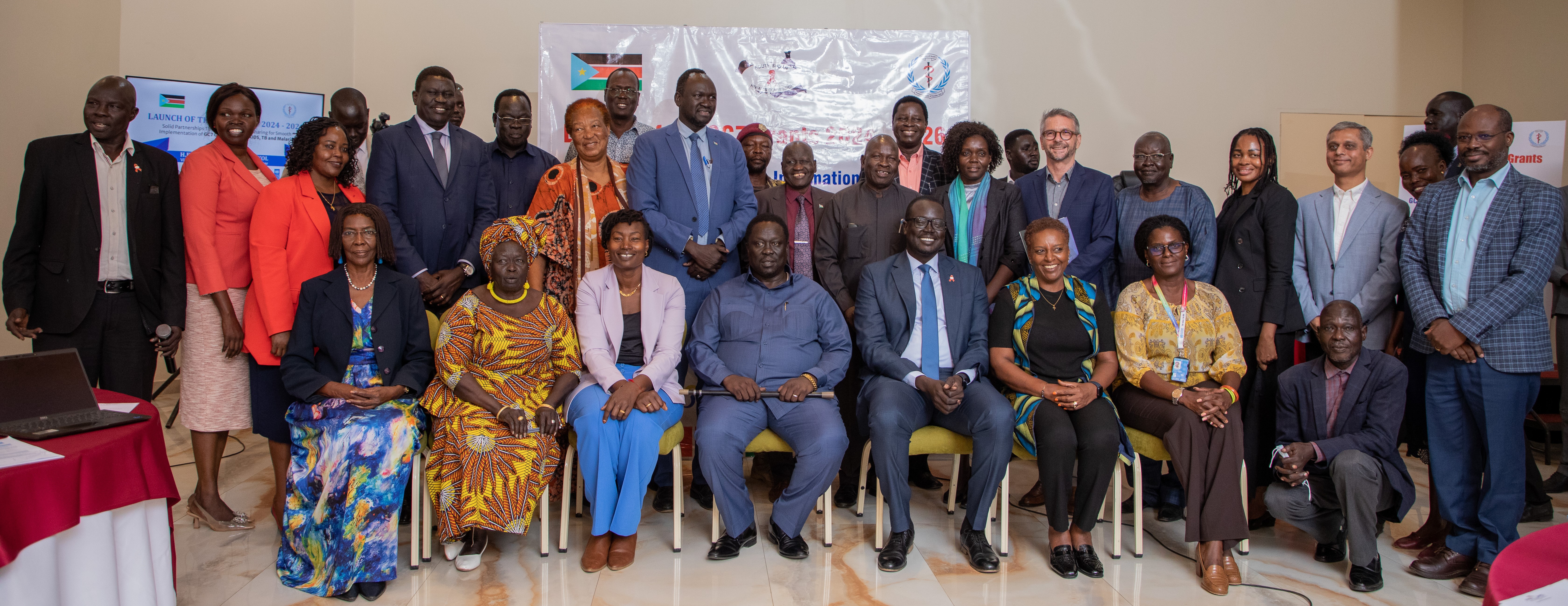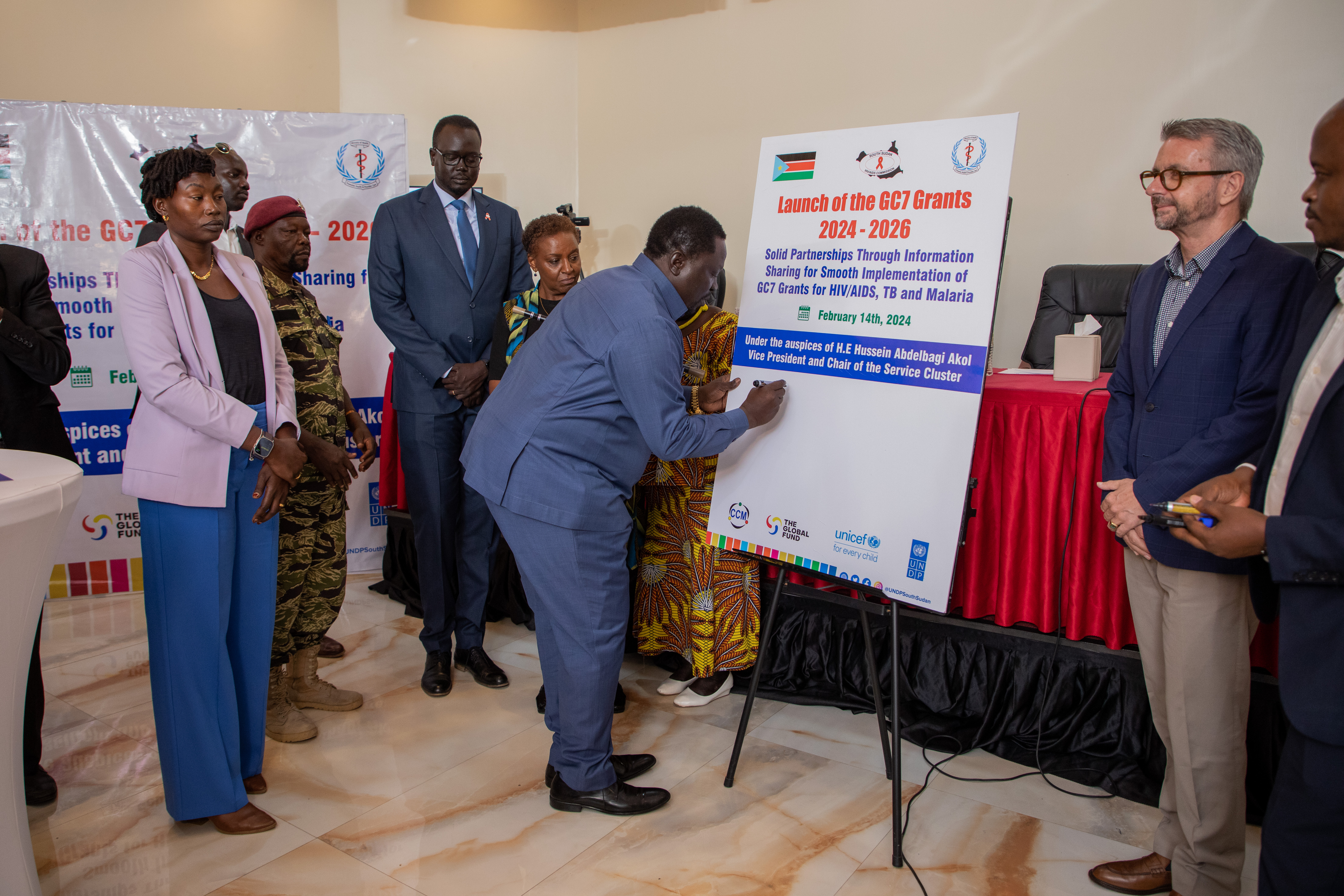Valued at US$167 million, the Grant Cycle 7 will be implemented over the period 2024–2026.
New Grant Launched to Drive Progress Against HIV/AIDS, TB, Malaria and Strengthen Health Systems
February 15, 2024

The Vice President and Chair of the Services Cluster H.E Hussein Abdelbagi Akol, the Minister of Health Minister Hon. Yolanda Awel Deng and other Government dignitaries and partners during the launch of the GC7 grant.
The Government of South Sudan, with funding from the Global Fund to Fight AIDS, Tuberculosis and Malaria, and in partnership with the United Nations Development Programme (UNDP), and the United Nations Children Fund (UNICEF), launched the Grant Cycle 7 (GC7) to consolidate gains and to strengthen the national response to HIV, TB and malaria in South Sudan from 2024 to 2026. The new grant was launched by the Vice President and Chair of the Services Cluster H.E Hussein Abdelbagi Akol on 14 February 2024.
Valued at US$167 million, the grant comprises $50.2 million for HIV, $17 million for TB, $23.5 million for Resilient and Sustainable Systems for Health (RSSH), $53.3 for malaria, and $23 million for pandemic preparedness and additional RSSH. This is the largest Global Fund contribution to the people of South Sudan since its independence in 2011. This grant supports the country’s vision of ending HIV and AIDS, TB and malaria as public health threats by 2030 and seeks to build resilient and sustainable health systems, and strengthen pandemic preparedness and response.
As the Principal Recipient for the HIV, TB, RSSH and C19RM components, UNDP, on behalf of the Government and its partners, will manage a total of $116.3 million, which is also the highest amount under UNDP’s stewardship in recent periods. UNICEF will manage the component for malaria valued at $53.3million.
These components of the grant build on the achievements made through previous periods of Global Fund support. These include strengthening health systems, as well as the procurement, storage and distribution of HIV, TB, COVID-19 medicines, laboratory reagents and health supplies, which has ensured access to vital medicines and therapeutics in over 200 hospitals and health facilities across the country. The new grant seeks to reach and impact 91,500 people living with HIV with life-saving medication, and to treat and cure as many as 26,000 people affected by TB per year. It will also equip over 28 hospitals and health facilities with solar power installations, as well as providing a secure and reliable supply of medical oxygen countrywide.
The GC7 grant also seeks to reduce new HIV infections by 25% by 2026, reduce AIDS-related deaths by 25% by 2026, maintain above 70% coverage of combination HIV prevention interventions for key and vulnerable populations, reach 85% of HIV-positive pregnant women by 2026, reach 3,000 of HIV-exposed infants (HEI) with early infant diagnosis (EID) by 2026 and reduce HIV-related discrimination and other inequalities towards people living with HIV and AIDS.

The Vice President and Chair of the Services Cluster H.E Hussein Abdelbagi Akol launches the GC7 grant. Looking on is the Minister of Health Hon. Yolanda Awel Deng and other Government dignitaries and partners.
The oversight of the grant will be undertaken by the Country Coordinating Mechanism (CCM), a multisectoral body that coordinated the development of the funding request that was submitted to the Global Fund expressing the country’s priorities.
The CCM Chairperson, Dr. Jane Alphonse said the launch signals the formal handover of the grant to the country, particularly the Ministry of Health and partners for immediate implementation. “As the CCM, we are going to revert to our oversight role,” she said, urging the government to execute the co-financing requirement for the effective implementation of the grant.
The Project Coordination Advisor for the UNDP–Global Fund Programme Mr. Russell Armstrong thanked the Global Fund, the Government and partners for the renewed confidence in UNDP as a partner of choice for the stewardship of precious Global Fund resources on behalf of the people of South Sudan. He pledged UNDP’s commitment to deliver on the aspirations of the GC7 and C19RM investments.
Hamida Lasseko, UNICEF Representative, welcomed the grant and credited the Government and partners for their commitment to the health of children in the country, emphasizing how malaria continued to be a leading cause of sickness and death for large numbers of young children in the country.
Media Contact:
Michael Mubangizi, Communications Specialist, UNDP – Global Fund Programme
Email: michael.mubangizi@undp.org, Tel: +211 925 001 268

 Locations
Locations